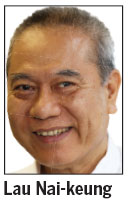Mumbo jumbo liberalismo
Updated: 2013-02-21 06:22
By Lau Nai-keung(HK Edition)
|
|||||||
Liberalism is a noble tradition of thought originating from the Age of Enlightenment in Europe. Philosophers Thomas Hobbes and John Locke developed the theory of social contract to bestow life, liberty and property as natural rights. At that specific time and space in history, when the propertied class in England was fighting the monarchy, liberalism was an appropriate and potent slogan for mobilization.
Propagated by less sophisticated minds today, liberal doctrines often sound naive. When the idea is transplanted into China, our compatriot copycat liberals make this tradition a downright joke.
Liberals in China, including those in the Hong Kong SAR, do not have to be well-versed in the classics of political philosophy. All they need is a magic phrase: universal values. And if they cannot pronounce it properly in English, they can say pushi jiazhi, which has the same meaning.
The fact that a banker lectured business school graduates about universal values reveals the confused state of liberalism in China. It happened on a fateful day in 2010, when graduates of one of China's leading business schools settled down in their academic finery to listen to a farewell address by Qin Xiao, then chairman of China Merchants Bank. They little expected what they were about to hear. Instead of rallying them to further the cause of China's socialist modernization, Qin urged them to resist the lure of worldly things and to pursue "universal values" such as freedom and democracy.

Qin's speech to an audience of 2,000 people in Tsinghua University's sports center fanned the flames of an ideological debate that has been smoldering in China since 2008, when 10 days after the Sichuan earthquake, a newspaper in the southern province of Guangdong, Southern Weekend, published an editorial that praised the government's swift response. It said the government had "honored its commitments to its own people and to the whole world with respect to universal values".
When liberals say "universal values", they really mean "their own values". However, what a banker values more than his year-end bonus is very likely not universal (look back at the Wall Street executive bonuses that followed the financial crisis if you have any doubt). Using universal values as an empty slogan is not only ridiculous, but also highly dangerous.
In Western philosophical tradition, something is of universal value if it has the same value or worth for all, or almost all, people. This claim could be interpreted in two ways. First, something could have a universal value when everybody finds it valuable. This was Isaiah Berlin's understanding of the term. According to Berlin, universal values are "values that a great many human beings in the vast majority of places and situations, at almost all times, do in fact hold in common, whether consciously and explicitly or as expressed in their behavior".
On the other hand, something could have universal value when all people have reason to believe it has value. Amartya Sen interprets the term this way, pointing out that when Mahatma Gandhi argued that non-violence is a universal value, he meant to say that all people have reason to value non-violence, not that all people currently value non-violence.
I usually agree with Amartya Sen, but this time I beg to differ. The first definition is straightforward and operational. Whether everybody finds a certain thing valuable is an empirical question. All we need to do is to ask them. But if you say universal value is something that everybody "has reason to value", first of all you have to assume a "universal reason" which is an even more dubious concept and this will certainly bring us nowhere.
The first definition brings us a simple yet fundamental question: are there values that most people around the globe - regardless of race, gender and social position - find valuable? Academic studies found that indeed there are. Here I would like to introduce you to the work of social psychologist S. H. Schwartz, a pioneer in the study of universal values. Schwartz received his education and professorship in the US but later moved to teach at the Hebrew University in Israel.
After surveying in 44 countries in 1994, Schwartz found that people universally value power, achievement, hedonism, stimulation, self-direction, universalism, benevolence, tradition, conformity and security.
What can you conclude from this set of universal values which are clearly full of conflicts? Can we deduce Western-style democracy from this heap of mumbo-jumbo?
The author is a member of the Commission on Strategic Development.
(HK Edition 02/21/2013 page1)